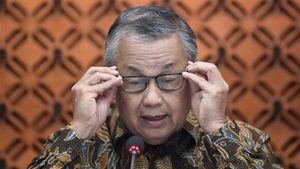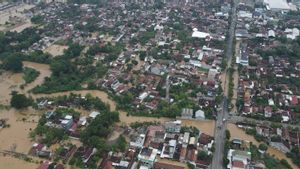JAKARTA - The labor sector faces a double impact when COVID-19 appears, not only in Indonesia but also globally. The pandemic that entered the country caused an increase in the number of unemployed and at the same time disruptions that accelerated the transformation of the Industrial Revolution 4.0.
Trends of working from home that arise due to the pandemic encourage the development of types of digital work. At the same time new jobs appear, there are also types of traditional jobs that become less relevant.
The existence of disruption due to the pandemic is also coupled with the fact that there is still a discrepancy between the needs of the industry and the skills of the workforce in Indonesia.
The Pre-Employment Card was then launched in early 2020 to help Indonesian workers not only improve their abilities but also have the competencies needed by the current industry.
Yumna Via Hasiany is one of the workers who has succeeded in utilizing Pre-Employment Card training to improve the competence needed by the industry today.
His introduction to the Pre-Employment Card began when he began to become an immigrant in Jakarta in January 2020, two weeks after graduating from the Faculty of Information Engineering at the Islamic University of Kalimantan Muhammad Arsyad Al Banjarmasin, South Kalimantan.
Looking for work in the capital, the 25-year-old woman did not expect that she would just start a "war" on her first sudden job search for COVID-19 cases in the country to be confirmed in March 2020.
Not long after, the government decided to restrict community mobilization to suppress the spread of infection through the Large-Scale Social Restriction (PSBB) scheme.
Malang is unavoidable, still struggling to find work, Yumna even has to face conditions when many workers are laid off or even become victims of layoffs (PHK) as a result of the pandemic indirectly.
Facing this condition, the mother once said that the woman from Hulu Sungai Selatan Regency in South Kalimantan should be able to return to her hometown when she does not get a job in Jakarta.
"It's just that I'm really stubborn, I have to get (work)," said Yumna when met by ANTARA at the Pre-Employment Card event in Bali.
He realized it was not easy. Many competitors are looking for work in the capital city and being graduates who came from Kalimantan had made him feel a little inferior.
That's when he got information about the Pre-Employment Card Program while surfing on social media. Interested in the incentives and training provided, Yumna then registered and was accepted to be a participant when the 2nd Wave of registration opened.
As soon as he received training assistance funds, he immediately took training according to his expertise as a programmer or programmer.
Yumna takes web programming training for beginners and Androids that takes about a month to complete. That's considering the training has about 155 modules.
Time management is needed to complete all those trainings, with each day he can learn 8 to 9 learning modules. At the end of the training he then had to create a simple app that would be tested whether it could run according to the programmed one.
"For example, if the application doesn't work, you can't get a certificate. Automatically the incentives don't get disbursed," he said.
His efforts paid off. After successfully graduating from training he was contacted by the training institute who praised the application and interviewed him to appear on their social media.
Not long after, including the certificate obtained from the Pre-Employment Card training, Yumna was later accepted as a web programmer at a logistics company located in West Jakarta.
Getting a one-year experience at the company, he then resigned in 2021 and proposed to a Pertamina subsidiary.
There he lasted for a year according to his contract and then decided to resign in mid-2022.
"Because in my opinion, programmers like me must seek as much experience as possible," he said.
He then applied and was accepted into a private bank to become a programmer for mobile banking to date.
Yumna said that pre-employment card training has contributed to her success so far. When many people lose their jobs due to the pandemic and current economic conditions, he actually gets many job offers.
"Because when you have skills, it's easy to find work," he said.
Not quickly satisfied with his current condition, he continues to update his portfolio and improve his abilities.
He hopes that the valuable experience he gets from the Pre-Employment Card training can be enjoyed by more people in Indonesia. Especially to ensure the workers have the abilities that are now needed by the employers.
Employment market disruptions that are increasingly shifting to the digital realm are taking place in Indonesia. Jobs related to digitization such as the programmer profession occupied by Yumna are now one of the jobs that has high demand in the job market.
But on the other hand, there is still a gap between what is needed by employers and the abilities possessed by job seekers. From a study conducted by the Central Statistics Agency (BPS), 53.3 percent of workers currently have educational backgrounds that are not in accordance with their work.
As one of the steps to follow up on the issue, the Coordinating Ministry for Economic Affairs is collaborating with the World Bank to create a skills monitoring system that harmonizes educational programs and skills according to the demands of the business world and the industrial world.
The first step taken from the monitoring system is to prepare a Critical Occupation List (COL) or a Critical Work List in Indonesia.
The results were found in addition to several traditional works such as plantations and construction, there were also several jobs in the digital field that became the prima donna of the industry.
The same thing was also found by a study on the Tasks and Skills of Indonesian Work (Indonesia's Occupational Tasks and Skills/Indotask) in 2020.
From the study, five important jobs from 51 professions were found, namely software developers, graphic design, building architects, marketing managers and financial analysts.
Executive Director of Pre-Employment Card Program Implementing Management Denni Puspa Purbasari said that the program was also present to equip with skills and knowledge relevant to the job market and new habits arising from the pandemic.
Digitalization and accelerated job market disruption due to the pandemic require Indonesian workers in the formal or entrepreneurial sectors to adapt to emerging "new normal".
"This program provides them with skills and knowledge that are relevant to the new markets and habits formed due to the pandemic," Denni said at the APEC Workshop 2022 last October.
Facing various work market conditions, he ensures that the focus of the program continues to provide workers and prospective workers with relevant abilities. Because what can make the workforce survive in the midst of competition is high mastery of skills.
The English, Chinese, Japanese, Arabic, and French versions are automatically generated by the AI. So there may still be inaccuracies in translating, please always see Indonesian as our main language. (system supported by DigitalSiber.id)













